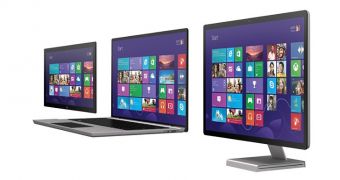Microsoft has made quite a lot of improvements to its operating system lately, so the company hopes that partners across the world are ready to take over the Computex show in early June with lots of new announcements.
Redmond said in a short teaser post on Twitter that Computex would witness the unveiling of several new Windows devices and although some thought that Microsoft might in the end unveil the new Surface Mini, it's the company's partners the ones that will steal the show.
The post was made by Microsoft's OEM account, so the software giant was most likely referring to devices prepared by its partners, including Toshiba, which has recently unveiled its first Windows 8.1 with Bing tablet.
Although some people familiar with the matter suggest that Microsoft might still unveil the new Surface Mini at some point, an 8-inch tablet that could be marketed as a note-taking device, chances are that Redmond won't show any new product at Computex on June 3 and 4, but instead focus on the ones prepared by its partners.
The company has recently announced that manufacturers would be provided with a new Windows 8.1 SKU specifically designed to help them build more affordable products that would boost the adoption of its modern operating system.
Windows 8.1 with Bing doesn't bring too many differences as compared to the standard Windows 8.1 version, but features Bing as the default search engine in Internet Explorer. Users are still allowed to choose Google or any other search engine if they wish, Microsoft said.
There are no details regarding the price of these devices, but previous reports indicated that some could retail for less than $250 (180 euros) in order to compete with low-cost Android tablets.
Of course, Microsoft clearly needs such a strong effort coming from partners, especially because the adoption of both Windows 8 and 8.1 remains low, despite the strong investment it has made in these two operating systems. Redmond has also tweaked the modern platform to work better on low-spec devices, so it now requires only 1GB of RAM and 16 GB of storage space, enough to be installed on tablets.
At the same time, Microsoft has to bring more affordable units to the market in order to get users off Windows XP, the OS version that no longer receives updates and security patches since April 8. The high costs of the upgrade to a different platform have always been considered a major issue for those still on Windows XP, so bringing more affordable devices to the market would surely come in handy.

 14 DAY TRIAL //
14 DAY TRIAL //